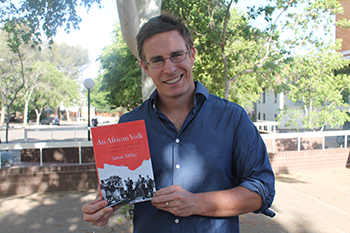Latest News Archive
Please select Category, Year, and then Month to display items
10 March 2022
|
Story Anthony Mthembu
|
Photo Unsplash
 The No Student Hungry team gearing up to start distributing food parcels to the selected students.
The No Student Hungry team gearing up to start distributing food parcels to the selected students.
The UFS is one of the many institutions of higher learning where food insecurity is an active issue. However, the
No Student Hungry Programme is one of the initiatives launched at the university to assist in fighting food insecurity at the institution.
The purpose of the programme
Since its inception in 2011, the initiative has assisted many students in acquiring a healthy meal. Additionally, the Food Environment Office also hands out food packages, so that students can continue to achieve academically. “We are trying to develop a healthy environment for students and make it easier for them to have a nice and healthy meal,” stated Annelize Visagie, who heads the Food Environment Office at the UFS. The Food Environment programme is spread out on all three campuses, each with its own facilitators. Furthermore, the programme mainly caters for students who are not funded by the National Student Financial Aid Scheme (NSFAS) but who are excelling academically. The abovementioned students apply for assistance online, and a list is then drawn up of students who receive assistance for the year.
Alternative solutions to keep the initiative running
On the Bloemfontein Campus, the No Student Hungry Programme will be catering for 200 students in the 2022 academic year, assisting them with a daily nutritious meal. Additional food parcels are also handed out to provide further assistance. “We give food parcels to the students on the list every Tuesday and Thursday at the Thakaneng Bridge,” Visagie highlighted. However, she argues that catering for the student population through this programme can be a challenge, as the demand for assistance is growing rapidly and the ability to assist is limited. The programme relies on partnerships and sponsors to assist the student body. In fact, the coordinators of the programme currently have a memorandum of understanding with Tiger Brands according to which they deliver around 100 food parcels for distribution.
In addition, the coordinators have put in place alternative measures to ensure that they can provide more food to students. “The
Kovsie Act Office, in partnership with the
Department of Sustainable Food Systems and Development, has started a food garden where healthy and nutritious produce are grown, in order to add value to the distribution,” she indicated. Although the programme can only assist to a point, students who are in desperate need of assistance are never turned away. In fact, the
Social Support Unit at Thakaneng Bridge usually assists students with food vouchers for a maximum of four days.
A commitment to teaching healthy eating habits
The programme is not only committed to curbing food insecurity, but also to ensuring that students have a healthy and balanced diet. As such, a booklet is being issued by the
Department of Nutrition and Dietetics in collaboration with the Department of Sustainable Food Systems and Development, which contains ways in which students can make a healthy meal using some of the ingredients offered in the food parcels.
“We want to teach students how to eat healthy in the cheapest way, because they don’t have a lot of money to buy expensive food products,” Visagie argued.
US author launches book at UFS on African volk
2016-10-17

Dr Jamie Miller, Postdoctoral Fellow at the
University of Pittsburgh and author of
An African Volk: The Apartheid Regime
and Its Search for Survival.
Photo: Rulanzen Martin
“I realised the importance of not just accessing the policies and political approaches of the leaders of the apartheid regime, but understanding the ideas and world views that informed them. Part of the solution to this was to learn Afrikaans.”
This is according to Dr Jamie Miller, a Postdoctoral Fellow at the University of Pittsburgh, on how he went about getting inside the mind of South Africa’s apartheid regime in order to complete his book, An African Volk: The Apartheid Regime and Its Search for Survival.
The book was launched on 11 October 2016 by the Archive for Contemporary Affairs at the University of the Free State on the Bloemfontein Campus.
Volk refers to the Afrikaner nationalist movement
The book is an ambitious new international history of 1970s apartheid South Africa. It is based on newly declassified documents and oral histories, the majority in Afrikaans, which focus on the regime’s attempts to turn the new political climate to its advantage.
The term volk refers to the Afrikaner nationalist movement, also known as Afrikanerdom. The story of Afrikaner nationalism was the medium through which the regime gained power.
Four main messages from the book
Dr Miller says there are four main messages for his readers. Firstly, the apartheid regime looked to contest and hijack new ideas and norms that formed the postcolonial world, and secondly, that we need to start thinking more seriously about the Cold War in terms of domestic politics, not just geopolitics.
Thirdly, South Africa should be integrated into histories of the global South, and lastly, we should conceptualise the apartheid regime by looking at it not just as an imperial holdover, but also by looking at what was happening in the world in the time period in question.